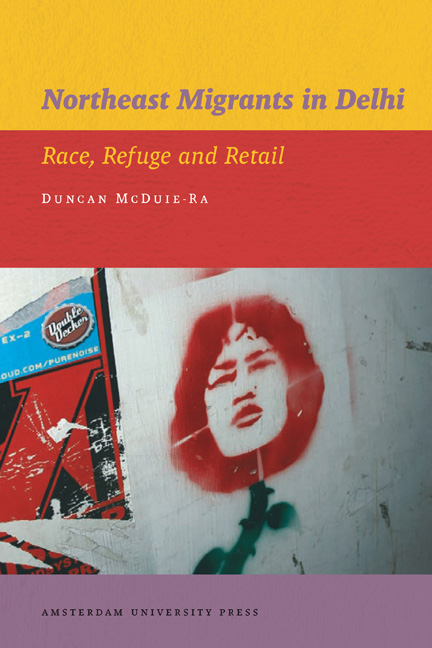Book contents
- Frontmatter
- Contents
- List of Maps and Images
- Acknowledgements
- Maps
- 1 Introduction
- 2 Leaving the Northeast
- 3 Coming to Delhi
- 4 Backward, Head-hunter, Sexy, Chinky
- 5 Provincial Men, Worldly Women
- 6 Place-making in the City
- 7 Conclusion
- Short Biographical Note on the Author
- Bibliography
- Index
- Publications Series
5 - Provincial Men, Worldly Women
Published online by Cambridge University Press: 14 January 2021
- Frontmatter
- Contents
- List of Maps and Images
- Acknowledgements
- Maps
- 1 Introduction
- 2 Leaving the Northeast
- 3 Coming to Delhi
- 4 Backward, Head-hunter, Sexy, Chinky
- 5 Provincial Men, Worldly Women
- 6 Place-making in the City
- 7 Conclusion
- Short Biographical Note on the Author
- Bibliography
- Index
- Publications Series
Summary
Racism gives the Northeasterner's experience of Delhi a commonality that transcends gender. Beyond this commonality, gender differences in the experience of migration are stark. Leaving aside violence and sexual harassment for the moment, there is a strong sense that Northeast women flourish as migrants while men struggle. This divergence affects relations between men and women migrants. In this chapter I explore these relations and argue that migration from the frontier ruptures the sense of masculinity among Northeasterners. Faced with rapid change, Northeast men attempt to enact the gender norms of home. This leads to strain between men and women. As discussed in the previous chapter, Northeast women are subject to stereotypes about their looseness and sexuality. The constancy of these stereotypes in everyday interactions in the streets, in the labour market, and on campuses provokes the desire among Northeast men to protect and police Northeast women in the city.
In contrast to dominant methods of gender analysis on South Asia generally and migration in particular, I have chosen to analyse gender relations through the prism of masculinity (see Chopra 2004). In doing so, I remain faithful to a gendered analysis that considers the experiences of women and men and relations between men and women. However, I argue that it is masculinity that is most ruptured by migration and that this has the greatest impact on gender relations and evolving gendered identities among Northeast migrants. Again, this is not something readily visible in the frontier itself, though the long-term impact on gender relations back home could be profound in the future.
In this chapter, intersectionality is used as a method of inquiry into the ways Northeast masculinity is experienced, expressed, challenged, and altered through migration. Initially, scholars used intersectionality to examine the intersections of race, class, and gender and to generate a feminist praxis to challenge oppressive structures faced by ethnic minority women (Crenshaw 1991). In recent years, the concept has broadened to account for the intersection of ‘multiple axes of differentiation’ (Brah & Phoenix 2004: 76), which can create ‘hierarchies of differential access to a variety of resources – economic, political and cultural’ (Yuval-Davis 2006: 199).
- Type
- Chapter
- Information
- Northeast Migrants in DelhiRace, Refuge and Retail, pp. 119 - 144Publisher: Amsterdam University PressPrint publication year: 2013



